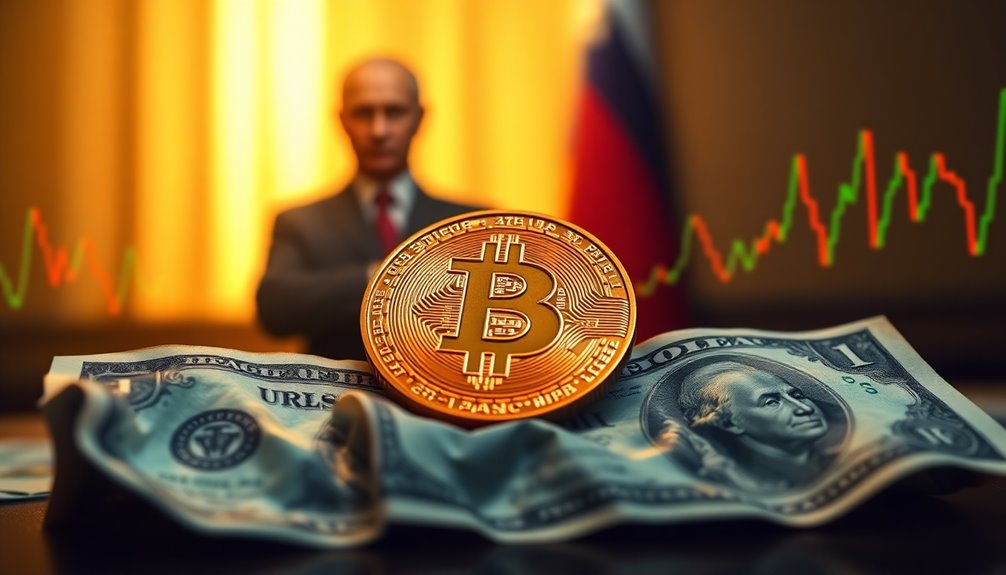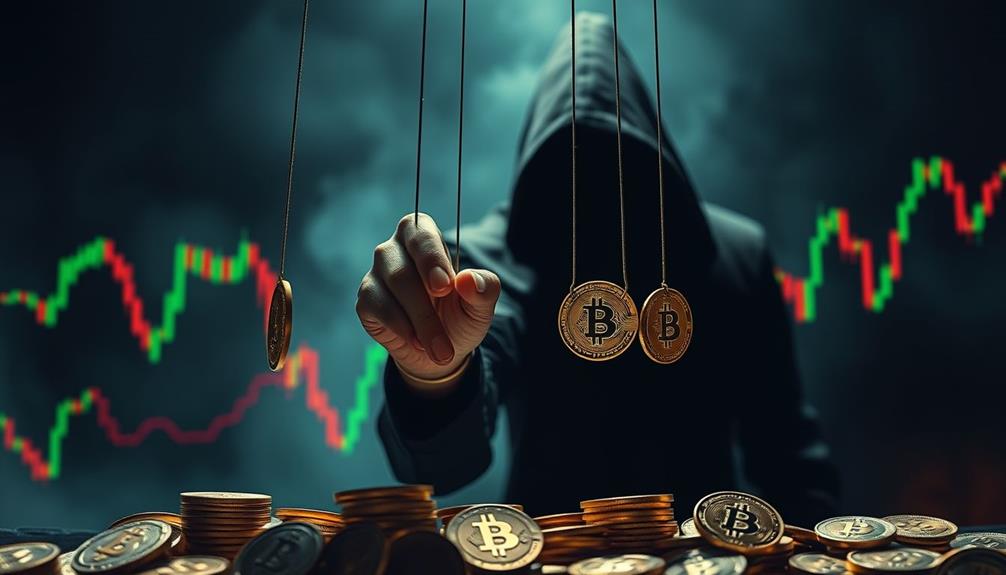Putin’s pro-Bitcoin declaration is a game-changer for global finance. By embracing Bitcoin, he challenges the U. S. dollar’s dominance, especially as Russia seeks to navigate economic sanctions. Legalizing cryptocurrency in Russia paves the way for using digital currencies in international trade, reducing dependence on traditional banking systems. This could trigger significant shifts in the financial landscape, possibly leading to a multi-currency world. As the cryptocurrency market gains traction, heightened demand and changing regulations could impact Bitcoin’s value and its role in global transactions. To truly grasp the implications of this shift, there’s plenty more to uncover. Moreover, the move may inspire other nations facing similar economic pressures to consider alternative currencies, further eroding the U. dollar’s influence in international markets. As the idea of a multi-currency world gains momentum, the potential for a “stunning treasury takedown explained” rises, where established financial norms are challenged by the rapid adoption of decentralized digital assets. This evolving scenario may force regulators to adapt quickly, as the lines between traditional finance and cryptocurrency become increasingly blurred.
Key Takeaways
- Putin's endorsement of Bitcoin signifies a strategic move to reduce reliance on the U.S. dollar amid escalating Western sanctions.
- Legalizing cryptocurrency mining in Russia promotes local economic resilience and facilitates international trade using digital currencies.
- Increasing global cryptocurrency adoption may challenge the dollar's status as the dominant reserve currency, leading to a multi-currency world.
- Rising Bitcoin prices and market sentiment, influenced by geopolitical events, indicate potential shifts in global financial dynamics.
- Concerns over inflation and Economic Policy Uncertainty could further elevate Bitcoin's appeal as an alternative to traditional currencies.
Context of Putin's Statement

In the wake of escalating Western sanctions, Putin's recent pro-Bitcoin declaration underscores Russia's urgent need to adapt its economic strategies. Facing a downward economic spiral, the country has enacted significant legislation to legalize cryptocurrency mining and facilitate its use for international payments. This move reflects a shift back to core economic principles, such as nationalization and protectionism, as Russia aims to support local businesses by reducing imports to Soviet-era levels.
The new laws allow Russian businesses to engage in international trade using cryptocurrencies, marking a notable departure from the Central Bank's previous push for a total ban on digital currencies. With trials for cryptocurrency payments on the horizon, the government anticipates substantial revenue from this sector, expecting to collect up to 200 billion rubles annually from miners. Additionally, as part of this legislative shift, new laws are effective from September for cross-border payments, indicating a structured approach towards integrating cryptocurrencies into the economy.
Putin's declaration also hints at a pragmatic approach to currency use, where he acknowledges Russia doesn't reject the dollar but seeks alternatives due to being denied its use as a payment instrument. Overall, this legislative shift illustrates Russia's determination to adapt to economic pressures while exploring innovative financial instruments in a changing global landscape.
Impact on Global Finance

Amidst shifting global finance dynamics, Putin's pro-Bitcoin stance signals a significant challenge to the dollar's longstanding dominance. By promoting cryptocurrencies, Russia aims to enhance its economic autonomy and create alternatives to traditional financial structures, which could shake up global markets.
Here are three key impacts on global finance:
- Erosion of Dollar Dominance: Putin's critique of the dollar as a political tool indicates a growing desire among nations to reduce reliance on the US currency, potentially leading to a multi-currency world.
- Increased Cryptocurrency Adoption: With new regulations in place, Russia's embrace of Bitcoin as a global reserve asset might encourage other countries to follow suit, further legitimizing cryptocurrencies for international payments. Recently, Russia formalized taxation on cryptocurrencies, providing clarity and encouraging investment in the sector.
- Financial Stability Risks: As cryptocurrencies gain traction, central banks might feel compelled to introduce their own digital currencies, which could alter the landscape of global finance and introduce new stability concerns.
These shifts could redefine how you view international trade and investment, making it essential to stay informed about the evolving role of cryptocurrencies in global finance. One key development to watch is the growing influence of blockchain technology, particularly through the use of platforms like Injective Protocol. This decentralized exchange protocol allows for borderless trading of any asset, including cryptocurrencies, stocks, and more. With the potential to disrupt traditional financial systems, keeping abreast of developments in platforms like Injective Protocol will be crucial for understanding the impact of cryptocurrencies on global finance.
Legal and Regulatory Framework

Russia's recent legal and regulatory developments around cryptocurrencies represent a pivotal step in shaping the nation's financial landscape. The Federation Council's approval of amendments to the Tax Code formalizes a taxation framework for digital currencies, defining them as property for tax purposes. You'll find that income from crypto transactions is taxed under a progressive system, with rates of 13% for lower earnings and 15% for higher brackets. This enhances transparency, especially for mining operators who must now report their activities to local tax authorities.
Additionally, new legislation offers legal recognition for cryptocurrencies, providing tax relief on digital transactions and exempting crypto mining and sales from VAT. However, it also allows for potential bans on mining in specific regions. Only registered businesses and entrepreneurs can legally mine cryptocurrencies, while the central bank retains authority to restrict transactions deemed risky. This framework is expected to encourage crypto mining as the industry flourishes amid Western sanctions.
The laws also establish a framework for crypto mining, ensuring rights and obligations for industry players. As Russia moves toward validating blockchain transactions, the first overseas transactions in cryptocurrencies are expected by the end of 2024, further solidifying its commitment to innovation in the financial sector.
Economic Sanctions and Crypto

Facing significant economic sanctions, many countries, including Russia, are turning to cryptocurrencies as a means to navigate the financial restrictions imposed by the West. With the loss of access to the SWIFT banking system and increasing isolation, these nations are seeking alternative payment methods to maintain international trade.
Here are three key motivations for this shift toward crypto:
- Bypassing Sanctions: Cryptocurrencies offer a way for heavily sanctioned countries to conduct transactions without relying on traditional banking systems, allowing them to engage in trade with reluctant partners.
- Reducing Dollar Dependence: Using digital currencies can help countries diminish their reliance on the U.S. dollar, which is essential in mitigating the effects of sanctions on their economies.
- Adapting to New Financial Realities: The Russian government sees cryptocurrency as an evolution in global finance, believing it will continue to grow regardless of the dollar's dominance. However, the increasing focus on mixing services and ransomware complicates these efforts as they create obfuscation, hindering compliance checks.
However, challenges remain. The transparency of blockchain technology complicates evasion efforts, and the regulatory landscape makes it tough for sanctioned entities to fully utilize crypto for their needs.
Bitcoin Price and Market Impact

As you consider the impact of geopolitical events on Bitcoin prices, it's clear that market sentiment plays a vital role in shaping trends. Putin's endorsement of Bitcoin could spark increased demand, influencing future price predictions and investor behavior. You'll want to watch how these dynamics unfold, especially as we approach significant market events like the halving. This potential surge in demand may be further supported by Bitcoin's record-breaking performance in November 2024, where its price surged from ~$67,000 to nearly $100,000.
Geopolitical Influence on Prices
In today's volatile financial landscape, geopolitical events considerably influence Bitcoin prices and market dynamics. The interplay between Economic Policy Uncertainty (EPU) and the Geopolitical Risk Index (GPR) shows that Bitcoin often acts as a hedge against economic and geopolitical uncertainties. When tensions rise, such as during the Russia-Ukraine conflict, Bitcoin tends to benefit, highlighting its potential safe-haven property.
Here are three key influences of geopolitics on Bitcoin prices:
- EPU Impact: Higher economic policy uncertainty correlates positively with Bitcoin returns, indicating that investors may turn to Bitcoin during uncertain times. Furthermore, Economic Policy Uncertainty in the U.S. shows a strong correlation with market volatility, suggesting that increased EPU leads to higher Bitcoin returns while decreased EPU increases volatility.
- GPR Influence: Increased geopolitical risks, reflected in the GPR, also lead to rising Bitcoin prices, as people seek refuge in digital assets.
- Legislative Changes: Countries like Russia are establishing regulatory frameworks for cryptocurrencies, which can further impact market dynamics and investor confidence.
Understanding the connection between these geopolitical factors and Bitcoin's price movements is essential for maneuvering this digital asset's market. As tensions fluctuate, so too will the opportunities and challenges for Bitcoin investors.
Market Sentiment and Trends
Market sentiment plays a crucial role in determining Bitcoin's price trajectory and overall market impact. Recently, you might've noticed the U.S. dollar climbing to a six-month high, which pulled Bitcoin back 1.2% to $86,945 after hitting a new all-time high. This dollar strength is driven by expectations surrounding inflationary tariffs, creating a tougher environment for risk assets like cryptocurrencies. As international investors face reduced purchasing power, Bitcoin's valuation feels the pressure. Additionally, the strengthening dollar has been noted to exert downward pressure on cryptocurrency valuations, complicating the overall market outlook. Implementing risk management strategies can help investors navigate these challenging conditions more effectively.
On a brighter note, cryptocurrency adoption in Russia is on the rise, with 86% of Russians now familiar with crypto, indicating growing interest. Legalization of crypto mining is also set to take effect soon, potentially releasing new opportunities.
The Crypto Fear and Greed Index shows that sentiment has remained overwhelmingly positive, lingering mostly in the greed range. Bitcoin's recent surge past $100,000 was fueled by supportive comments from key political figures, but profit-taking led to a slight price drop to near $98,000. With price targets still set above $100,000, market trends suggest that demand remains strong, despite potential volatility. Analysts believe that bitcoin’s potential rally to $120k could be driven by increased institutional adoption and growing interest from retail investors, who see the cryptocurrency as a hedge against inflation. Additionally, the upcoming halving event is expected to tighten supply further, amplifying upward pressure on prices. Despite minor pullbacks, long-term sentiment remains firmly bullish as excitement builds around bitcoin’s milestones.
Future Price Predictions
Bitcoin's future price predictions reflect a dynamic landscape shaped by various factors, including recent geopolitical developments and market trends. With Putin's endorsement, many speculate on Bitcoin's role as a potential global reserve currency. Analysts have forecasted significant price movements in the coming years, suggesting both bullish and cautious perspectives.
Here are three key predictions to contemplate:
- 2025 Peak Estimates: Predictions range from $115,200 (average) to a high of $200,000, indicating strong bullish sentiment among forecasters. Additionally, understanding market volatility can assist investors in making informed decisions during price fluctuations.
- Long-Term Growth: By 2030, estimates suggest Bitcoin could soar to between $312,767 and $672,000, showcasing its potential as a long-term investment. Moreover, investing in a Bitcoin IRA allows for tax-efficient growth, further enhancing its appeal.
- Market Volatility: Bitcoin's volatility remains a double-edged sword, offering high potential gains but also substantial risks compared to more traditional assets like the US dollar and gold. Furthermore, the BTC to Nasdaq ratio breakout confirms the bullish predictions for 2025, reinforcing the optimism surrounding Bitcoin's future.
As geopolitical tensions evolve, Bitcoin's price trajectory may continue to be influenced by global economic shifts and regulatory changes, making it essential to stay informed about market trends and forecasts. Your investment strategy should reflect these insights as you navigate the cryptocurrency landscape.
Future Outlook and Implications

A notable shift in global finance is on the horizon as Putin's pro-Bitcoin declaration signals a new era for cryptocurrency. This endorsement reflects Russia's strategic pivot to mitigate Western sanctions, showcasing cryptocurrencies as tools for financial stability and efficiency. You might notice that countries are increasingly adopting digital currencies for cross-border payments, challenging the traditional dominance of the US dollar.
As the cryptocurrency market surpasses $1.1 trillion, you can expect a surge in global adoption. Russia's recent legislation to legalize cryptocurrency mining and international transactions highlights a growing acceptance of digital currencies. This shift not only offers an alternative store of value but also fosters financial inclusion, especially in regions grappling with inflation. Furthermore, the dollar's dominance is bolstered by its entrenched role in global finance, making it essential to observe how these developments unfold. The rise of cryptocurrencies also raises security risks related to online transactions, which could impact their stability and adoption.
However, the implications for the US dollar are profound. The rise of cryptocurrencies may erode its status as the global reserve currency, prompting discussions on necessary financial reforms. As nations explore decentralized options, the potential for a multi-polar financial world becomes clearer. You should keep an eye on these developments, as they could reshape global economic dynamics and influence the future of finance considerably.
Frequently Asked Questions
How Does Bitcoin Function as an Alternative Currency?
Bitcoin functions as an alternative currency by operating on a decentralized peer-to-peer network, allowing you to send payments directly without intermediaries. It's entirely digital, with value determined by an algorithm that monitors transactions. You initiate a transaction, which gets verified through digital signatures and added to the blockchain. With lower fees and faster processing times, Bitcoin provides financial inclusivity, making it accessible globally, though it comes with volatility and security risks you should consider.
What Are the Risks of Investing in Bitcoin?
When you consider investing in Bitcoin, be aware of several risks. High volatility can lead to significant losses, as prices can swing wildly. Security risks also exist; wallets and exchanges might be hacked, putting your funds at risk. Additionally, regulatory challenges make it hard to navigate the crypto landscape. Since cryptocurrencies are speculative, they might not suit your investment strategy, especially if you're looking for long-term stability. Always do your research first.
How Do Cryptocurrencies Impact Traditional Banking Systems?
Cryptocurrencies greatly impact traditional banking systems by challenging their established roles. You'll notice that with decentralized transactions, you can bypass banks, cutting down on fees and processing times. As a result, banks must adapt or risk losing customers. They're pressured to incorporate blockchain technology and reevaluate their services to stay competitive. This shift also requires new regulations to protect users while allowing financial institutions to engage with the growing crypto landscape effectively.
What Technological Advancements Support Bitcoin's Security?
To understand how technological advancements support Bitcoin's security, you should look at its immutable ledger and decentralized verification processes. These features guarantee that once data's added, it can't be tampered with. Cryptographic hashing links each block, making alterations detectable. Additionally, the use of private and public keys secures transactions, while consensus mechanisms prevent fraud. All these innovations collectively create a robust and secure environment for Bitcoin, minimizing risks from external threats.
How Can Individuals Get Started With Cryptocurrency Investments?
Did you know that over 300 million people worldwide are now using cryptocurrencies? To get started with cryptocurrency investments, choose a user-friendly exchange like Coinbase or Kraken. Research popular coins like Bitcoin or Ethereum, and consider diversifying your portfolio. Set up a secure wallet to keep your investments safe. Finally, start small—make fractional purchases, and develop a strategy that fits your goals. This way, you'll build confidence as you navigate the crypto world.
Conclusion
As you ponder Putin's bold pro-Bitcoin stance, consider the potential ripple effects on the global economy. Could this declaration signal a seismic shift in how nations view currency and power? The dollar's dominance has hung in the balance for decades, but with crypto gaining ground, the landscape is changing. What's next? Will other leaders follow suit, and could Bitcoin truly redefine finance as we understand it? The answers might just reshape your financial future.









